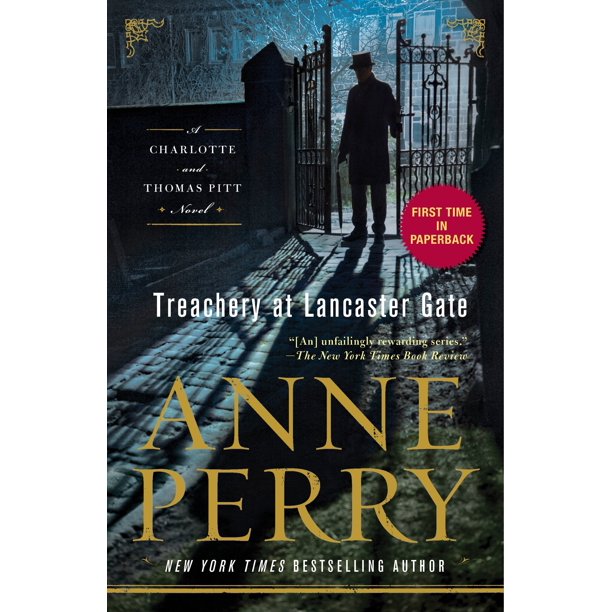
Monday
Having read most of Terry Pratchett’s Discworld books before losing interest with Unseen Academicals, I’ve moved on to Anne Perry’s Charlotte and Thomas Pitt novels, which offer a different kind of pleasure. Thomas is a cop who joins and eventually heads England’s “Special Branch,” which handles highly sensitive cases of national security. Charlotte is his upper-class wife who often helps him solve his mysteries. Set in Victorian England, the series offers us anarchistic plots, international diplomacy, aristocratic malfeasance, and police corruption. In Treachery at Lancaster Gate (2016), which I’m currently reading, the plot reminds me only too much of our current politics.
The year is 1898 and five police have been killed in what at first appears to be an anarchist bombing. Anarchy does in fact loom large, but it’s more like the anarchy that we are currently witnessing from the Trump administration, the anarchy that emerges when faith in guardrail institutions is undermined.
In Lancaster Gate, Special Branch keeps such a close eye on anarchist organizations that it is fairly sure that they are not behind the bombing. This means it may be a revenge killing against bad cops. When Thomas and Charlotte begin to detect official corruption, they are horrified:
“Charlotte…” he protested, but the argument died before he could find words for it. What she was suggesting was extreme, but the breaking of trust in government was the beginning of anarchy. And it would not be the first time.
“Frighten people, make them angry,” she went on, “and they can be persuaded to do all kinds of things. If I were in danger and the police would not protect me, wouldn’t you do so yourself?”…
“I shall consider that very dangerous possibility,” he promised. “It is one of the many things we need to watch for. As you say, if you want to ruin a nation, begin by ruining their trust in the law. Then each man will take it into his own hands, and you have anarchy.”
At present we ourselves have a Department of Justice that is acting increasingly lawlessly. Assistant U.S. attorney for Massachusetts James Herbert recently (and courageously) summed it up in a letter written to the Boston Globe:
“From his misleading summary of the Mueller Report, to his selective intervention in cases against political allies of the president, to his accusation that victims such as George Floyd are being used as mere ‘props’ by those calling for racial justice, to his baseless claims about mail-in ballots, William Barr has done the president’s bidding at every turn,” he wrote.
“For 30 years I have been proud to say I work for the Department of Justice, but the current attorney general has brought shame on the department he purports to lead,” Herbert added.
In addition to Barr shenanigans, of course, we are watching court packing, political pressure on the health agencies, systematic undermining of the intelligence services, an assault on public education, corrupt officials selling off the nation’s public lands, and on and on. In the novel, everyone wants to blame swarthy men with East European accents, just as Trump and Barr want to blame Black Lives Matter protesters. As in many Perry novels, however, the real culprits are the people in positions of public trust who find scapegoats to deflect from their own corrupt agendas.
Perry only seems to be writing about the 19th century.
Further thoughts: Since writing this post, I’ve finished the novel and have seen more connections with present days events. The police, after having accidentally killed an innocent man in a drug raid gone bad, shift the blame to a drug addict, who is subsequently hanged. An unscrupulous lawyer with political ambitions, Josiah Abercorn, takes the police’s side, demonizing anarchists and immigrants the way that Trump demonizes immigrants and African Americans:
If Charlotte was correct and [Abercorn] was busy courting public support, he would find a great deal of it. The bombing had stirred up a powerful undercurrent of fear. Most people were frightened by the specter of uncertainty, disorder, and panic in the streets. There were more and more immigrants in London, and they were easy to identify….They were an easy focus for the fear that displayed itself as anger.
Was Abercorn feeding that fear, and hoping it would in turn feed him? It was despicable, but he certainly would not be the first, or the last, to use it for his own ends.
If justice does not prevail, then state anarchy is unleashed. One wishes that Trump’s GOP enablers would heed the words of Gracie Tellman, who tells us what happens when people responsible for upholding the law allow the Trumps of the world to get away with lawbreaking:
But someone what ’urts other people if ye’re the law, yer gotta draw a line an’ say, “If yer do this, then it’ll cost yer.” If yer don’t, then they know they can do anything they like, and yer won’t ever do anything.
I can’t say that Anne Perry is a great author–her novels are formulaic and suffer from too many plot holes–but I’m with her on her moral messages. Oh, and she hooks the reader with her characters.